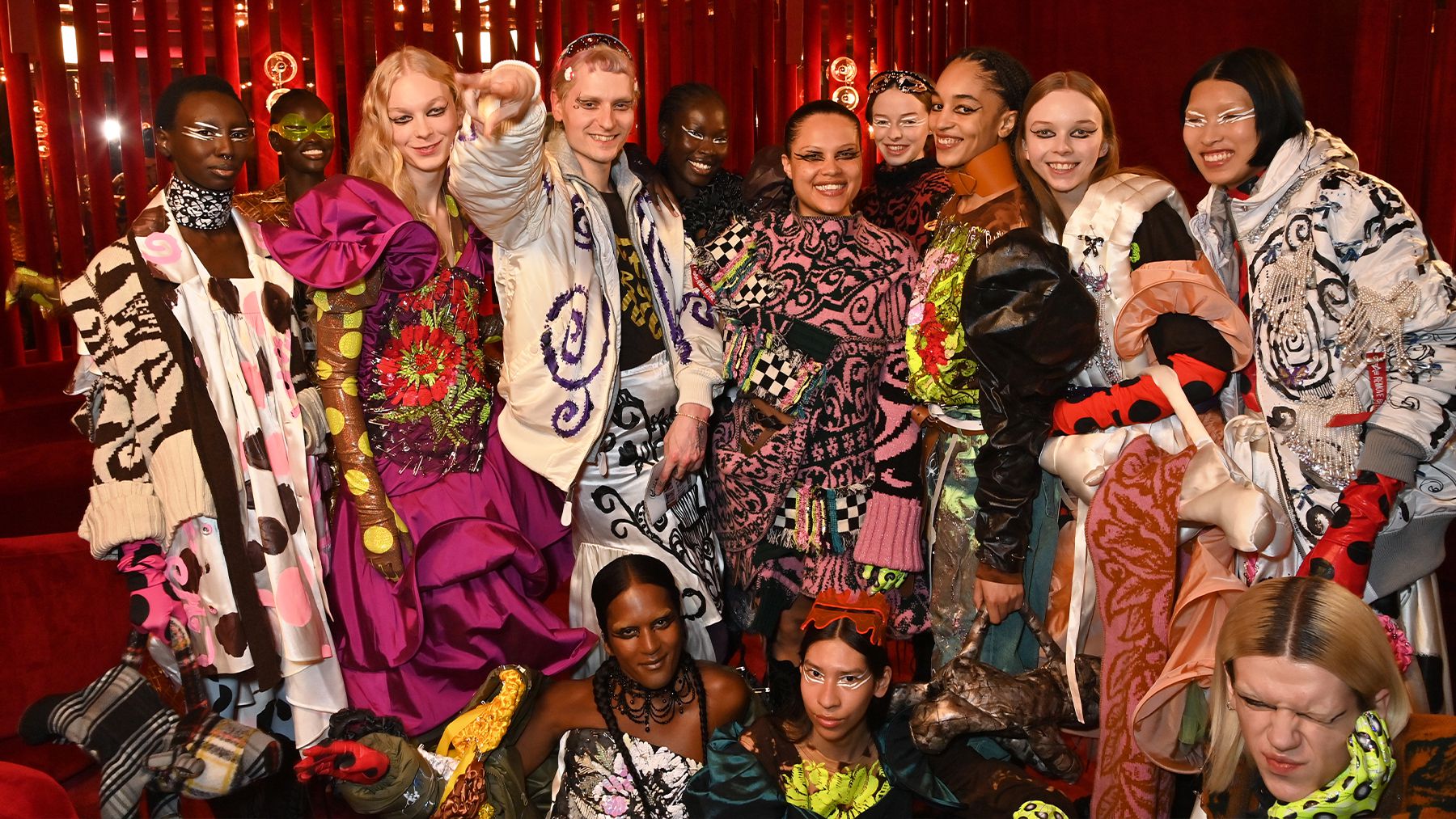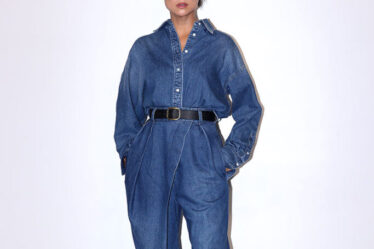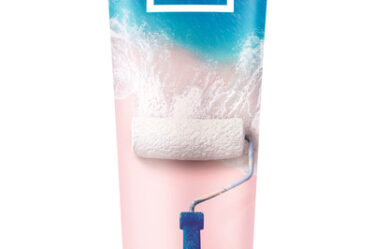
LONDON — London Fashion Week began with a tribute to Vivienne Westwood, one of fashion’s most important pioneers, and not just from these shores. Everyone from Victoria Beckham to Helena Bonham Carter gathered at Southwark Cathedral to pay their respects to Dame Vivienne, the punk queen who died last December aged 81. Her influence on fashion is so potent that oftentimes designers can’t help but have a whiff of Viv in what they do. The reference was wholly deliberate when Marc Jacobs paid tribute to Westwood in New York at the start of the month, and it was certainly present among the shows on the first two days of London Fashion Week.
Like Westwood, the designer Harris Reed isn’t afraid to put himself out there. It’s to his advantage that his fans have been able to follow his emotionally candid journey through social media. Actress Florence Pugh opened Reed’s latest show, declaring: “I invite you to embrace the lamé and sequins of life as all the world’s a stage!” Reed gave us heavy doses of those made-for-stage, high-shine fabrics, with some pieces made from repurposed theatre drapes. Under a spotlight, his fit-and-flare silhouettes, augmented by Henry Moore-inspired black velvet collar sculptures, cast dramatic shadows in the Tanks at Tate Modern. The resourcefulness of theatre costume design can be seen in Reed’s demi-couture. “We work with constraints and we get to make up a dream with the things that are given to us,” he said. Nina Ricci, for which Reed will show his first collection in Paris on March 3rd, will be a bigger stage.
In a sign of the times, London’s fledgling designers are pushing for true diversity, leaving behind the days when a token plus-size model made headlines. Sinead O’Dwyer doesn’t need to shout about designing for everyone. She just does it. And by everyone she means a real breadth of body sizes and genders; wheelchair-users, too. Her signature zig-zag net shirred knits stretch easily over curves but O’Dwyer has also been slowly exploring tailoring, inspired by her school uniform days, with school ties that then segued into halter necks. A very pregnant Tessa Kuragi and her visible linea nigra rounded out O’Dwyer’s convincingly inclusive casting.
Later in the day, pregnancy — both real and constructed — was the theme at Dimitra Petsa’s first London show for her brand Di Petsa. Her wet look dresses, drenched in sensuality, have garnered her a staunch online following. She celebrated her debut by performing poetry alongside her models. The writhing body movement and orgasmic cries may have been a tad distracting, but there was a lot of love in the house for Petsa’s Gen-Z goddess gowns in draped velvet and tulle, cloaked in scent of burning sage and accessorised with pomegranates and shells.
At Fashion East, Karoline Vitto is also leading the charge for shape diversity, designing from size 10 to 20 and doing so from the get-go. The Brazilian-born designer has adapted her barely-there, flesh-driven dresses to autumn/winter by looking to 80s power dressing, and giving it a Vitto twist with metal slinky spines that snake up the side of jackets and skirts, which gave the clothes verve. The Fashion East vibe shift from visual maximalism to refined dressing was reflected in the subtly sculpted eveningwear of Standing Ground, designed by Michael Stewart. Gowns with discreet hip padding, windswept satin minis and silk jersey column dresses with undulating bands at the hips showcased Stewart’s stealth made-to-order strength.
New to the Fashion East cohort was Estonian-born Johanna Parv who brought something curiously singular — forward-thinking attire for those that regularly ride London’s cycle lanes. You don’t expect to see graduate designers thinking about functionality. The results were garments such as a coat that can be stretched over a backpack or skirt that can be hiked up at speed.
The start of London Fashion Week also saw the return of Huishan Zhang, as outbound travel from China comes back. His normally ladylike femininity took a darker and sultry turn with Hitchcock heroines clothed in deceptive fabrics like denim made to look like lush velvet and sharp slits. Elsewhere, Edward Crutchley attempted to build a collection around the heady scents of orris and oud by playing with light and dark in his streetwear fused with oddities like a black leather codpiece.
But perhaps the biggest takeaway from the first two days of London was the emphasis on sustainability, which Westwood underscored decades ago. Fashion East alum Ancuta Sarca is building out her brand with Y2K clogs and square-toed heels branded visibly with her name but anchored with upcycled Nike swooshes in her literally on-point boot hybrids. Matty Bovan, whose homespun collaged creations have often taken up runway widths, chose to pare things back — well, comparatively speaking. Opting for a presentation format for the first time, you could see the intricate work that went into the shaping of Bovan’s hand-drawn, hand-touched ensembles. Westwood’s DNA runs strong in Bovan, but he has his own specific knack for marrying chaos with charm, which was well served by a more concise showcase.
As one of the few Americans in London, Conner Ives is definitely dropping the word “deadstock” from his vernacular. Especially as talk of sustainability inevitably weighs down the clothes in question. “We really need to attempt to bring back some happiness, joy and FUN!” he said backstage. To a mish-mash of 2000s bangers, Ives once again looked to archetypes and characters. Kate Moss at Glasto. Coyote Ugly’s bartender girl. Mrs Robinson. And American socialites that formed “The Shiny Set,” a term coined by Nicholas Coleridge, former Condé Nast Britain boss, to describe couture clients. Ives is ambitious in his scope, even whilst working within the limitations of secondhand textiles. With a heavy dose of irony, Ives serves sustainability up seamlessly, an example of Westwood’s “buy well, choose well, make it last” mantra in action.



